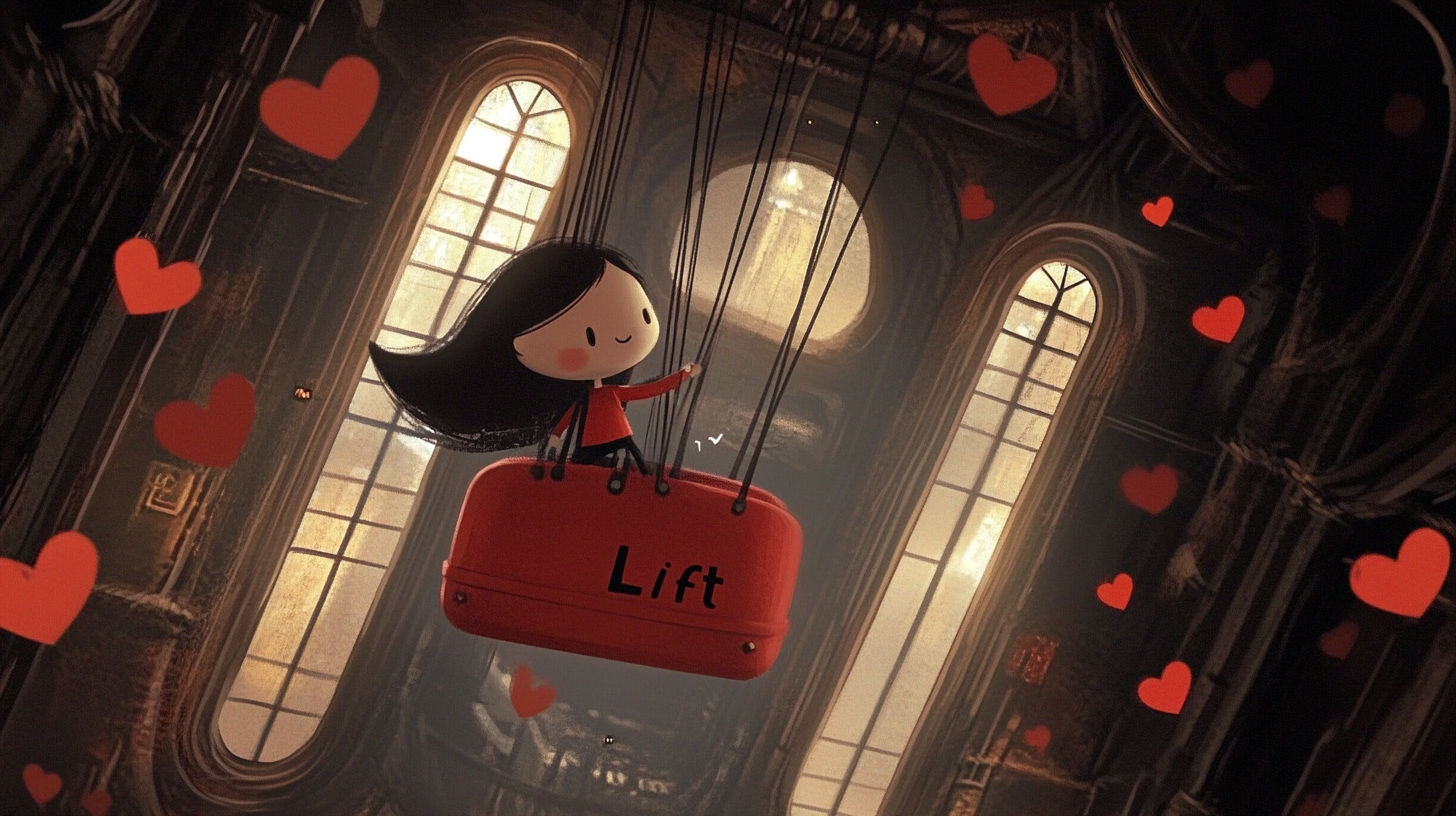“Lift” means to move something up or a machine that carries people up in a building.
以下は英単語 “lift” に関するストーリー型学習コンテンツです。まずは大枠の意味を理解して最後の文章で確認しましょう。
主な意味(main meaning)
| 品詞 | 意味 | 発音記号 | 例文 |
|---|---|---|---|
| 動詞 | 持ち上げる、引き上げる | /lɪft/ | He tried to lift the heavy box by himself. |
| 名詞 | エレベーター、持ち上げること | /lɪft/ | She took the lift to the fifth floor. |
語源(etymology)
「lift」は古ノルド語の「lypta(持ち上げる)」に由来し、「上へ動かす」というイメージが核です。
類義語(synonyms)
| 類義語 | 例文 |
|---|---|
| raise | She raised her hand to ask a question. |
| hoist | They used a crane to hoist the car. |
| elevate | Regular exercise can elevate your mood. |
| boost | The new advertisement boosted sales. |
| heave | He heaved the sack onto his shoulder. |
「lift」と「raise」はどちらも「持ち上げる」という意味がありますが、使い方やニュアンスに違いがあります。
| 比較項目 | lift | raise |
|---|---|---|
| 基本の意味 | 力を使って物や人を「持ち上げる」 | 位置や状態を「上げる」または「高める」 |
| 主語 | 人・機械など(実際に動作するもの) | 人(意志で動かす)や自然な動き(感情・価格など) |
| 目的語の種類 | 物理的なもの(箱、人、重い物) | 抽象的なものも含む(声、価格、手など) |
| よく使う例 | lift a box, lift someone, lift weights | raise your hand, raise prices, raise a question |
| 自動or他動 | 他動詞(lift+目的語)または自動詞(lift off) | 他動詞のみ(raise+目的語) |
| ニュアンス | 動作の物理的な面が強い | 状態やレベルを高める意味が強い |
反義語(antonyms)
| 反義語 | 例文 |
|---|---|
| lower | He slowly lowered the baby into the crib. |
| drop | She accidentally dropped her phone. |
コロケーション(collocations)
| コロケーション | 例文 |
|---|---|
| lift weights | He goes to the gym to lift weights. |
| lift a ban | The government decided to lift the ban on travel. |
| lift your spirits | Her kind words lifted my spirits. |
| get a lift | I got a lift to the station from my neighbor. |
| lift off | The rocket will lift off at noon. |
2項表現(binomials)
| 表現 | 例文 |
|---|---|
| rise and lift | The balloon began to rise and lift into the sky. |
| lift and carry | Nurses often have to lift and carry patients. |
英語ストーリー(english story)
Title: A Lift to a Better Day
Emma worked as a receptionist on the 10th floor of a large office building. Every morning, she would take the lift to her desk. One rainy Monday, the lift was out of order, and she had to climb the stairs. By the time she reached her floor, she was out of breath and frustrated.
Her coworker, Jason, noticed and offered her a bottle of water. “Here, this might lift your spirits,” he said kindly. Emma smiled, feeling better.
Later that day, they learned that the lift would be fixed soon. Emma joked, “Maybe I should lift weights to get stronger for these stairs.” Jason laughed and said, “Or we can ask the company to hoist us up instead.”
That afternoon, they had a meeting where the manager announced that the travel ban had been lifted. Emma was happy—she had been planning to visit her parents. The news elevated everyone’s mood.
As they left the office, Jason gave Emma a lift home in his car. “Today didn’t start great,” she said, “but it ended well.”
和訳
タイトル:より良い一日への「リフト」
エマは大きなオフィスビルの10階で受付として働いています。毎朝、彼女はエレベーター(lift)で自分のデスクまで行きます。ある雨の月曜日、エレベーターが故障し、彼女は階段を使わなければなりませんでした。10階に着いた頃には、息が切れてイライラしていました。
同僚のジェイソンはそれに気づき、水のボトルを差し出しました。「はい、これで少し元気が出るといいけど」と彼は優しく言いました。エマは笑って、気分がよくなりました。
その日、午後にはエレベーターがもうすぐ修理されるという知らせがありました。エマは冗談で「階段用に筋トレでも始めるかな」と言いました。ジェイソンは笑って「会社に引き上げてもらうよう頼もうか」と答えました。
その後の会議で、マネージャーが旅行の禁止が解除されたと発表しました。エマは大喜びでした。両親に会いに行く計画をしていたからです。このニュースは皆の気分を明るくしました。
仕事の帰り、ジェイソンはエマを車で送ってくれました。「今日は最悪のスタートだったけど、いい終わり方だったわ」と彼女は言いました。



コメント